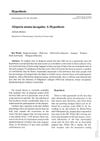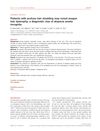autoimmune disorder causing patchy hair loss
a JAK inhibitor for alopecia areata and other autoimmune conditions
JAK inhibitor that reduces inflammation and immune attacks on hair follicles, leading to potential hair regrowth, especially in alopecia areata cases
diabetes drug with anti-inflammatory, immunomodulatory, and insulin-sensitizing properties




